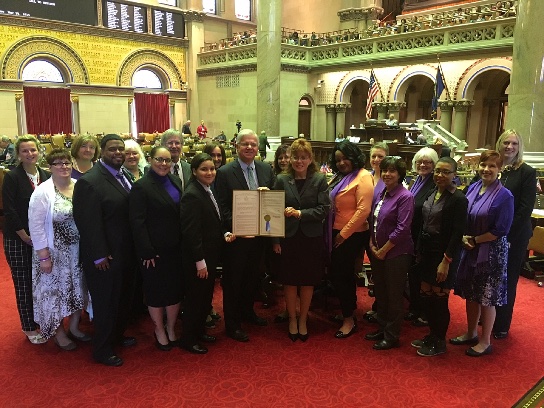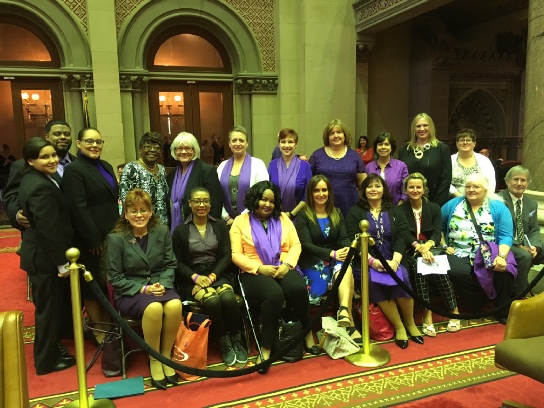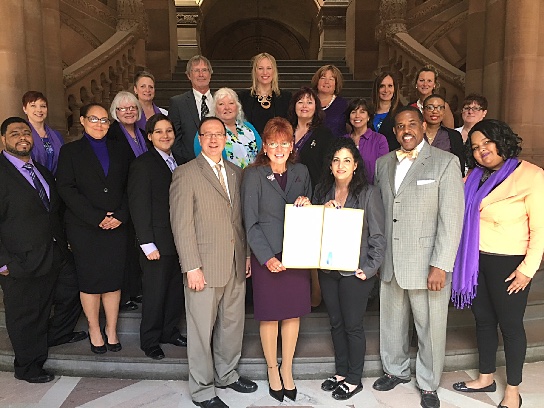May 2016 Proclaimed Lupus Awareness Month by New York State Legislature
Written by |

Today — Wednesday, May 18 — the six Lupus Agencies of New York State will be guests in the New York State Senate and Assembly as both houses recognize May as the 8th annual Lupus Awareness Month in the state. Legislative sponsors of the event are State Sen. Joseph Griffo and Assemblyman Fred Thiele.

The annual event educates New York State’s elected policymakers and staff, state agency officials, healthcare professionals, and the public about lupus and the need for greater program support for education, outreach, and research initiatives. Both legislative bodies have passed resolutions (Senate No. 3618 and Assembly No. 1263) memorializing Gov. Andrew M. Cuomo to proclaim May 2016 as Lupus Awareness Month in the State of New York, and are joining the Lupus Agencies of New York State in an effort to increase public awareness of lupus symptoms and health effects, and to support expansion and enhancement of lupus education and research programs.
The Lupus Agencies of New York State (LANYS) include the Lupus and Allied Diseases Association, Lupus Alliance of Long Island/Queens, Lupus Alliance of Upstate New York, Lupus Foundation of America, S.L.E. Lupus Foundation, Alliance for Lupus Research, Lupus Research Institute, and Lupus Friends and Family Foundation.
All have scheduled their May 2016 Lupus Awareness Day observance to coincide with the event at the State Capitol, and approximately 20 advocates from across the state will be attending to call public attention to lupus — a frequently debilitating disease that affects an estimated 105,400 New Yorkers, 1.5 million Americans, and 5 million people worldwide.
Key pieces of legislation the LANYS shared with lawmakers include:
• Taxpayer check-off to establish voluntary donations for lupus education, prevention, and outreach programs;
• Establishment of lupus education and outreach programs and Advisory Council comprised of representatives of people with lupus, their families and healthcare providers specializing in lupus;
• Creation of the lupus research enhancement program and fund;
• Regulation of Step Therapy protocol putting treatment decisions back in the hands of healthcare professionals rather than insurance companies;
• Pharmacy Choice Bill ensures consumers have the option to choose a local participating pharmacy and are not forced to mandatory mail order.
“The Lupus Agencies of New York State are dedicated to improving the quality of life for individuals with lupus and their loved ones by providing education, support, and outreach services, and promoting programs of awareness,
advocacy, and research,” said spokesperson Kathleen A. Arntsen, president and CEO of Lupus and Allied Diseases Association (formerly Lupus Foundation of Mid and Northern NY). “We applaud Senator Joseph Griffo as the Prime Senate Sponsor and Assemblyman Fred W. Thiele Jr. as the Prime Assembly Sponsor of the Lupus Resolution and all of our legislative champions who passed this important resolution for the Eighth Annual Lupus Awareness Month in New York State. We are excited that lupus is finally getting the recognition it deserves.”
Assemblywoman Crystal Peoples Stokes with lupus advocates – Photo Courtesy Lupus and Allied Diseases Association, Inc.
 “The more public awareness we can bring to lupus, the more hope for relief we can offer the millions of people worldwide who suffer from this devastating disease,” said State Sen. Joseph Griffo. “Too little is understood about lupus, and too many people don’t even realize they have it, which often prevents these individuals from getting the proper medical attention they need sooner rather than later. The only way we can get closer to a cure is to recognize the prevalence of lupus among our people, and to encourage the level of funding support and research this disease deserves. In recognition of May as Lupus Awareness Month, I am proud to partner with the Lupus Agencies of New York State toward achieving this important goal.”
“The more public awareness we can bring to lupus, the more hope for relief we can offer the millions of people worldwide who suffer from this devastating disease,” said State Sen. Joseph Griffo. “Too little is understood about lupus, and too many people don’t even realize they have it, which often prevents these individuals from getting the proper medical attention they need sooner rather than later. The only way we can get closer to a cure is to recognize the prevalence of lupus among our people, and to encourage the level of funding support and research this disease deserves. In recognition of May as Lupus Awareness Month, I am proud to partner with the Lupus Agencies of New York State toward achieving this important goal.”
Senate group photo from below with Senator Joseph Griffo, Kathleen A. Arntsen, Senator Diane Savino and Senator Kevin Parker (center front) – Photo courtesy Lupus and Allied Diseases Association, Inc.
Lupus is an acute and chronic inflammatory autoimmune disease in which a triggering agent causes the body’s immune system to attack its own tissue and can affect virtually any organ system of the body, including the skin, joints, kidney, brain, heart, lungs, blood, and blood vessels. Th currently incurable disease can cause seizures, strokes, heart attacks, miscarriages, and organ failure.
 According to the Centers for Disease Control (CDC), by the most conservative estimates at least 322,000 Americans have definite or probable lupus, with recent independent surveys suggesting prevalence may be as high as 1.5 million Americans battling some form of lupus, which typically strikes people in their prime, among them Assemblyman Fred W. Thiele Jr.’s daughter, Josephine, who is finishing graduate school at Boston University to pursue a career in the field of health and nutrition.
According to the Centers for Disease Control (CDC), by the most conservative estimates at least 322,000 Americans have definite or probable lupus, with recent independent surveys suggesting prevalence may be as high as 1.5 million Americans battling some form of lupus, which typically strikes people in their prime, among them Assemblyman Fred W. Thiele Jr.’s daughter, Josephine, who is finishing graduate school at Boston University to pursue a career in the field of health and nutrition.
“She is proof that with a proper diagnosis and treatment and armed with the necessary information, that one can live a full and successful life despite this illness,” Thiele said.

Assemblyman Fred Thiele, Jr. with NYS Lupus advocates in Assembly Chamber. – Photo courtesy Lupus and Allied Diseases Association, Inc.
Roughly 80 percent of new lupus cases are diagnosed in women — primarily in their childbearing years between the ages of 15 and 44 — and interfering with their ability to work, have or raise a family, or in some cases, even care for themselves. However, older women, men, and children can also be affected.
Some 90 percent of people diagnosed with lupus are women, yet 80 percent of women know little or nothing about the disease, which suffers from a lack of awareness more than any other major disease, even though it is more common than AIDS, sickle-cell anemia, cerebral palsy, multiple sclerosis, and cystic fibrosis, and is a leading cause of kidney disease, stroke, and premature cardiovascular disease.
Thiele said that lupus is often misdiagnosed, and an accurate lupus diagnosis can take as long as four or more years with visits to three or more physicians, and currently there are few therapeutic options for treating this complex, dangerous, and unpredictable disease that annually costs America an estimated $31.4 billion in direct and indirect expenditures.
Lupus is two to to three times more prevalent among women of color — including African Americans, Hispanics, Asian Americans, and Native Americans. Yet public awareness lags. For example, among Americans ages 18-34 polled, 72 percent had either not heard about lupus, or know little or nothing about the disease beyond the name.
Not only is the public knowledge of lupus lacking, even health professionals can be unaware of the symptoms and effects of lupus, resulting in delayed diagnosis and proper medical intervention and demonstrating the urgent need for increased public and professional awareness, with early diagnosis and treatment vital components in reducing lupus’s physical and economic impact.
The most common lupus symptoms are joint swelling, joint and muscle pain, extreme fatigue, fever, and skin rashes on the face, neck and scalp. Other symptoms can include sensitivity to sunlight, hair loss, fingers turning white or blue in the cold, low blood counts, and mouth or nose ulcers. Symptoms that might indicate vital organs are affected include chest pain on deep breathing (pleurisy), excessive protein in the urine, coronary artery disease, and seizures.
Lupus advocates note that research is underfunded compared to diseases of comparable magnitude and severity, and that current treatments for lupus are not adequate and some are even toxic, causing detrimental side effects with long-term use. Only four drugs are specifically approved for lupus so many treatments are off-label. No single test exists for diagnosing the disease, so many affected individuals are suffering more serious complications by the time a diagnosis is reached.
The purpose of the Annual Lupus Awareness Day is to help educate New York State’s elected policymakers, state agency officials, healthcare professionals, and the general public about lupus and the need for research program support to develop better diagnostic tests and safer, more effective treatments — and ultimately, discover the cure.
For more information about lupus, the Lupus Agencies of New York State, or Lupus Awareness Day, call 315-829-4272 or toll free 1-866-258-7874, or visit https://www.NoLupus.org.






